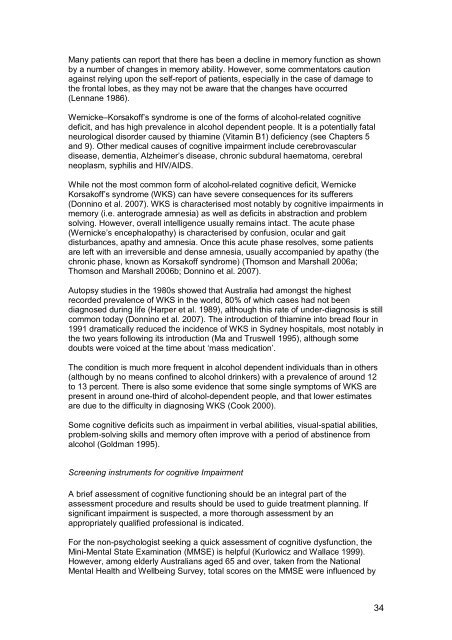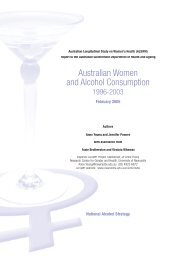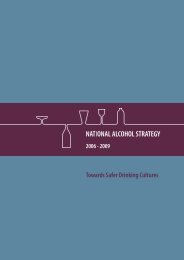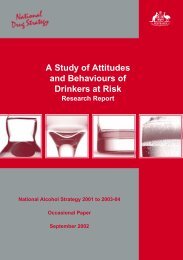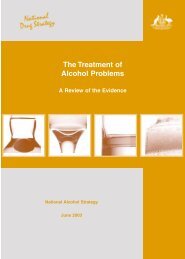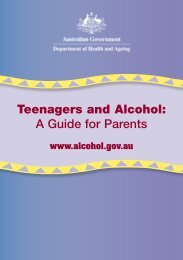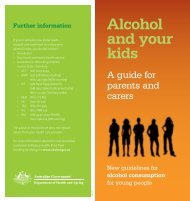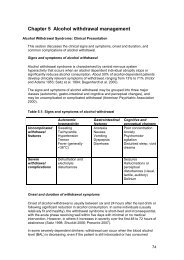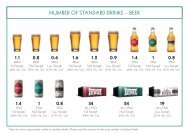Chapter 3 Screening, assessment and treatment planning - Alcohol
Chapter 3 Screening, assessment and treatment planning - Alcohol
Chapter 3 Screening, assessment and treatment planning - Alcohol
Create successful ePaper yourself
Turn your PDF publications into a flip-book with our unique Google optimized e-Paper software.
Many patients can report that there has been a decline in memory function as shownby a number of changes in memory ability. However, some commentators cautionagainst relying upon the self-report of patients, especially in the case of damage tothe frontal lobes, as they may not be aware that the changes have occurred(Lennane 1986).Wernicke–Korsakoff’s syndrome is one of the forms of alcohol-related cognitivedeficit, <strong>and</strong> has high prevalence in alcohol dependent people. It is a potentially fatalneurological disorder caused by thiamine (Vitamin B1) deficiency (see <strong>Chapter</strong>s 5<strong>and</strong> 9). Other medical causes of cognitive impairment include cerebrovasculardisease, dementia, Alzheimer’s disease, chronic subdural haematoma, cerebralneoplasm, syphilis <strong>and</strong> HIV/AIDS.While not the most common form of alcohol-related cognitive deficit, WernickeKorsakoff’s syndrome (WKS) can have severe consequences for its sufferers(Donnino et al. 2007). WKS is characterised most notably by cognitive impairments inmemory (i.e. anterograde amnesia) as well as deficits in abstraction <strong>and</strong> problemsolving. However, overall intelligence usually remains intact. The acute phase(Wernicke’s encephalopathy) is characterised by confusion, ocular <strong>and</strong> gaitdisturbances, apathy <strong>and</strong> amnesia. Once this acute phase resolves, some patientsare left with an irreversible <strong>and</strong> dense amnesia, usually accompanied by apathy (thechronic phase, known as Korsakoff syndrome) (Thomson <strong>and</strong> Marshall 2006a;Thomson <strong>and</strong> Marshall 2006b; Donnino et al. 2007).Autopsy studies in the 1980s showed that Australia had amongst the highestrecorded prevalence of WKS in the world, 80% of which cases had not beendiagnosed during life (Harper et al. 1989), although this rate of under-diagnosis is stillcommon today (Donnino et al. 2007). The introduction of thiamine into bread flour in1991 dramatically reduced the incidence of WKS in Sydney hospitals, most notably inthe two years following its introduction (Ma <strong>and</strong> Truswell 1995), although somedoubts were voiced at the time about ‘mass medication’.The condition is much more frequent in alcohol dependent individuals than in others(although by no means confined to alcohol drinkers) with a prevalence of around 12to 13 percent. There is also some evidence that some single symptoms of WKS arepresent in around one-third of alcohol-dependent people, <strong>and</strong> that lower estimatesare due to the difficulty in diagnosing WKS (Cook 2000).Some cognitive deficits such as impairment in verbal abilities, visual-spatial abilities,problem-solving skills <strong>and</strong> memory often improve with a period of abstinence fromalcohol (Goldman 1995).<strong>Screening</strong> instruments for cognitive ImpairmentA brief <strong>assessment</strong> of cognitive functioning should be an integral part of the<strong>assessment</strong> procedure <strong>and</strong> results should be used to guide <strong>treatment</strong> <strong>planning</strong>. Ifsignificant impairment is suspected, a more thorough <strong>assessment</strong> by anappropriately qualified professional is indicated.For the non-psychologist seeking a quick <strong>assessment</strong> of cognitive dysfunction, theMini-Mental State Examination (MMSE) is helpful (Kurlowicz <strong>and</strong> Wallace 1999).However, among elderly Australians aged 65 <strong>and</strong> over, taken from the NationalMental Health <strong>and</strong> Wellbeing Survey, total scores on the MMSE were influenced by34


